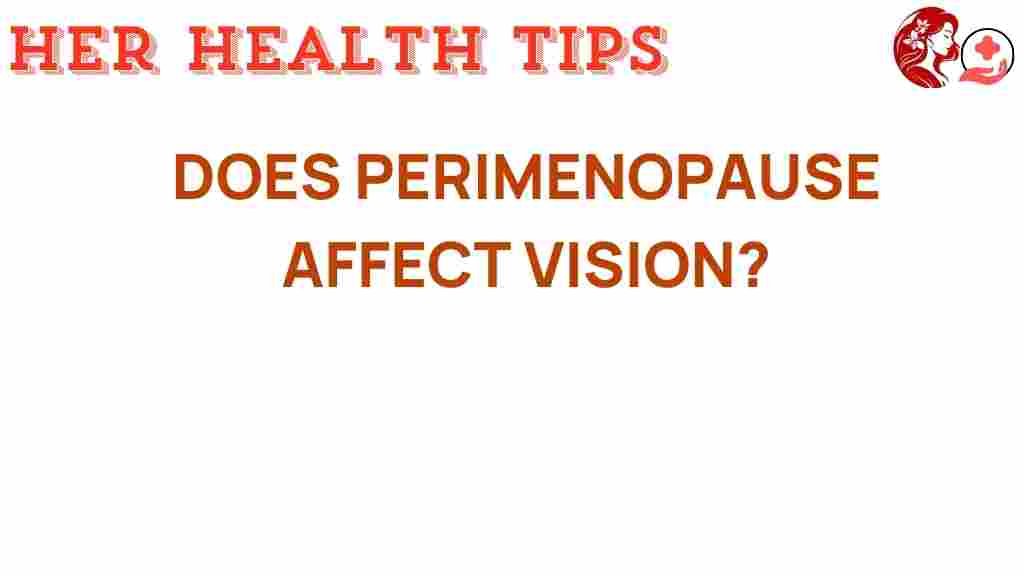Unveiling the Hidden Impact of Perimenopause on Vision
Perimenopause is a natural transition in a woman’s life, marking the gradual shift towards menopause. While many are aware of the common symptoms such as hot flashes and mood swings, few recognize how perimenopause can significantly impact vision and overall eye health. Understanding the connection between hormonal changes during this period and the effects on vision is crucial for women’s health. In this article, we will explore the symptoms, changes, and potential solutions related to eye health during perimenopause.
Understanding Perimenopause and Its Symptoms
Perimenopause refers to the phase leading up to menopause, characterized by fluctuating hormone levels, particularly estrogen and progesterone. This transition can begin as early as the late 30s and may last several years. The symptoms experienced during perimenopause can vary widely among women and may include:
- Irregular menstrual cycles
- Hot flashes and night sweats
- Sleep disturbances
- Mood swings
- Changes in libido
- Weight gain
Importantly, many women report experiencing changes in their vision during this time, which can be attributed to the hormonal fluctuations affecting various bodily functions, including eye health.
The Connection Between Hormonal Changes and Vision
Hormonal changes during perimenopause can lead to several eye health issues. Estrogen plays a crucial role in maintaining the overall health of the eyes, particularly in regulating moisture levels and protecting against oxidative stress. When estrogen levels decline, women may experience:
- Dry Eyes: Reduced tear production can lead to dryness, irritation, and discomfort.
- Increased Risk of Eye Conditions: Conditions such as cataracts and glaucoma may become more prevalent.
- Changes in Vision: Fluctuations in vision clarity or difficulty focusing can occur.
Recognizing these changes is vital for maintaining eye health during perimenopause.
Common Vision Changes During Perimenopause
Women undergoing perimenopause may experience a range of vision changes, including:
- Blurry Vision: Hormonal fluctuations can affect the shape of the eye, leading to temporary changes in vision.
- Sensitivity to Light: Increased sensitivity can make it uncomfortable to be in bright environments.
- Difficulty with Night Vision: Some women report challenges seeing in low-light conditions.
These symptoms can significantly impact daily life, making awareness and proactive measures essential.
Step-by-Step Guide to Managing Vision Changes During Perimenopause
If you are experiencing vision changes during perimenopause, consider the following steps to manage your symptoms:
1. Schedule Regular Eye Exams
Regular visits to an eye care professional can help monitor changes in vision and catch potential issues early. Inform your eye doctor about your perimenopausal symptoms to tailor your care effectively.
2. Use Artificial Tears
To combat dry eyes, consider using over-the-counter artificial tears. These can help lubricate the eyes and alleviate discomfort.
3. Protect Your Eyes from UV Rays
Wearing sunglasses with UV protection can help shield your eyes from harmful rays, reducing the risk of cataracts and other eye conditions.
4. Maintain a Healthy Diet
Incorporate foods rich in omega-3 fatty acids, vitamins A, C, and E, and antioxidants to support eye health. Foods such as:
- Leafy greens
- Carrots
- Fatty fish
- Nuts and seeds
are excellent choices for maintaining vision health.
5. Stay Hydrated
Drinking plenty of water helps maintain hydration levels, which is crucial for keeping your eyes moist and comfortable.
6. Consider Hormone Replacement Therapy (HRT)
For some women, HRT may help alleviate various perimenopausal symptoms, including those related to vision. Consult with your healthcare provider to discuss the potential benefits and risks.
Troubleshooting Common Eye Health Issues During Perimenopause
Here are some troubleshooting tips for common eye health issues associated with perimenopause:
Dry Eyes
- Use a humidifier in your home to maintain moisture in the air.
- Avoid smoke and other irritants that can exacerbate dryness.
- Take breaks during prolonged screen time to reduce eye strain.
Blurry Vision
- Ensure you have the correct prescription for your glasses or contact lenses.
- Practice the 20-20-20 rule: every 20 minutes, look at something 20 feet away for at least 20 seconds.
Night Vision Problems
- Increase lighting in your home to help with visibility.
- Consider using anti-reflective lenses to reduce glare from bright lights.
Raising Awareness About Eye Health During Perimenopause
Awareness of the connection between perimenopause and vision is crucial for women’s health. By understanding the changes that can occur, women can take proactive steps to safeguard their eye health. Sharing information about these changes can also help others recognize symptoms and seek help early.
Additionally, participating in community health events focused on women’s health can further raise awareness and encourage discussions about the lesser-known impacts of perimenopause.
Conclusion
Perimenopause is a significant phase in a woman’s life that brings various changes, including those affecting vision and overall eye health. Understanding the link between hormonal changes and vision can empower women to take charge of their health during this transitional period. By scheduling regular eye exams, maintaining a healthy lifestyle, and considering supportive therapies, women can mitigate the impact of perimenopause on their vision. Remember, staying informed and proactive is key to preserving your eye health as you age.
For more information on women’s health during perimenopause, visit this resource.
To learn more about eye health and related topics, check out this informational site.
This article is in the category Wellness and created by HerHealthTips Team

1 thought on “Unveiling the Hidden Impact of Perimenopause on Vision”